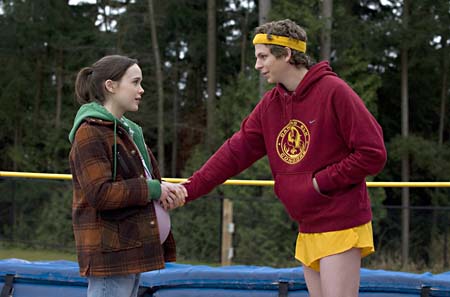« Charlie Bartlett (2007) – Movie Review | Home | 88 Minutes (2007) – Movie Review »
Juno (2007) – Movie Review
By Robert L. Jones | March 16, 2008

Pregnant Pause: Ellen Page and Michael Cera moments before the delivery
The Elephant in the Womb
[xrr rating=4/5]
Juno. Starring Ellen Page, Michael Cera, Jennifer Garner, Jason Bateman, Allison Janney, J.K. Simmons, Olivia Thirlby, Eileen Pedde, Rainn Wilson, Daniel Clark, Darla Vandenbossche, Aman Johal, Valerie Tian, Emily Perkins, and Kaaren de Zilva. Music by Mateo Messina. Cinematography by Eric Steelberg. Production design by Steve Saklad. Costume design by Monique Prudhomme. Edited by Dana E. Glauberman. Screenplay by Diablo Cody. Directed by Jason Reitman. (Fox Searchlight Pictures/Dancing Elk Productions, 2007, Color, 96 minutes. MPAA Rating: PG-13.)
A flurry of movies released last year dealt with that stickiest of subjects, abortion. Three comedies (Juno, Knocked Up, and Waitress) and one drama (Bella) featured story lines that, to one degree or another, dealt with a woman’s choice of whether to abort her unborn fetus or carry it to term and deliver her baby.
Surprisingly, in this PC age that has morphed the right to an abortion into a woman’s liberating act of empowerment, these four motion pictures have generated more widespread audience appeal than controversy. That they were made at all speaks volumes about society’s evolving attitudes since the1973 Supreme Court decision Roe v. Wade declared abortion to be constitutional. Among them, these flicks have won (so far) forty-six awards at film festivals and red-carpet galas. Juno alone has garnered thirty-six wins and took the Oscar statuette for best original screenplay, and was nominated in three other categories for Academy Awards (best actress, director, and picture).
Conservative pundits like Brent Bozell, David Frum, and Michael Medved have jumped on these movies’ bandwagons, seeing them as vehicles for “pro-life” political messages. The ensuing war of words in the media over whether these films are pro-abortion or anti-abortion reminds me of when zealots from both sides of the abortion issue adopted the pregnant Laura Dern, in the 1997 farce Citizen Ruth, as their respective movements’ poster child.
But these aren’t political movies. What has resonated with audiences is that these films all deal with the personal decisions of individuals. Perhaps Dern’s white-trash heroine Ruth Stoops was ahead of her time a decade ago when she fired back at her pro-choice handlers: “You want [to use me] to send a message? I ain’t no fucking telegram, bitch!”
While Knocked Up was a rather mindless, formulaic comedy aimed at younger audiences, and though I couldn’t get far enough past the hackneyed stereotypes of dumb Southerners in Waitress to empathize with its characters, Bella was a sincere morality tale with a compassionate outlook and complex narrative structure that rose above its otherwise conventionally melodramatic, almost soap-opera, plot.
But standing head-and-shoulders above the rest, Juno is a brilliant little gem of a comedy. It’s the brainchild of Hollywood newcomer and former stripper—and now, Oscar winner—Diablo Cody (her very name evokes imagery of hell on horseback) in her first screenwriting effort. It’s also the second feature directed by Jason Reitman, who started out on top of his game with his 2005 satire Thank You for Smoking.
Despite their short resumes, Cody and Reitman’s comparative inexperience works in their favor with this material. Juno is as blunt, offbeat, and fresh as its title character, played by twenty-year-old Ellen Page, who I was rooting for to win this year’s best actress Oscar. (The young Canadian actress lost out to French actress Marion Cottilard for La Vie en Rose).
Juno MacGuff is a sixteen-year-old tomboy and budding punk-rock guitarist growing up in a Minnesota suburb, which always seems to be covered with snow, even in spring. And which gives the precocious teen a lot of down time in her parents’ den to be bored—bored enough to have sex just for the hell of it with her best friend, Paulie (Michael Cera), who’s as soft-spoken as Juno is brash.
A couple months later, she takes an instant pregnancy test in a convenience store restroom after getting inconclusive results the first go-around. “I think the last one was defective,” she complains to the store clerk. “The plus sign looked more like a division symbol.”
But when the test shows positive, Juno realizes she’s got a little more than she bargained for. “That ain’t no Etch-A-Sketch,” the clerk enlightens her. “This is one doodle that can’t be undid.” She goes to a local abortion clinic called “Women Now.” A schoolmate (Valerie Tian) stands outside the clinic, protesting. “All babies want to get borned,” she tells Juno.
Inside, Juno is shocked at the vacuity of the airhead (Emily Perkins) at the clinic’s front desk (“Would you like a free condom? They’re boysenberry.”), and we see her silently questioning the wisdom of having the procedure performed in such a facility. So, she changes her mind and decides to go through with the pregnancy.
Juno enlists the aid of her friend Leah (Olivia Thirlby) for moral support when it comes time to break the news to her family. “I can give this baby to somebody who needs it,” Juno rationalizes. “Like a woman with a bum ovary. Or a couple nice Lesbos.”
Juno’s folks take the bad news surprisingly well. Her working-class dad, played by always-gruff J.K. Simmons, questions who the father of the child is. When told, his response is simultaneously unpredictable yet, coming from Simmons, somehow totally expected: “Paulie Bleeker? I didn’t think he had it in him!” Her nail-technician stepmom (Allison Janney) goes into full crisis mode as she takes charge of helping Juno through her pregnancy.
I liked this bit. Although her parents are both supportive and a little disappointed in her for being so careless, when she leaves the room their reaction is typical Boomer misplacement of priorities: They would have preferred Juno to have been into hard drugs or even arrested for a DUI—a reflection of why so many offspring of that generation are screwed up. Boomers or not, and despite their bass-ackwards logic, Juno’s lucky to receive tough love from her hard-headed stepmom and level-headed father.
Soldiering on, she searches for a suitable couple to adopt the baby by reading the classifieds in the local PennySaver. She finds a couple in an upscale suburb a few towns away, whom she and her dad visit in their well-worn minivan. They have an awkward but fruitful meeting with thirtysomething Vanessa (Jennifer Garner, a way-better actress than she gets credit for), who desperately wants to become a mother but is biologically unable to. Vanessa and Juno don’t hit it off at all. The flannel-shirt-wearing, slacker girl finds ironic humor in the family portraits that line the staircase, of Vanessa and her husband, dressed all in white.
However, Juno comes to identify with husband Mark (Jason Bateman), whose Yuppie persona masks a kindred free spirit who’s also into punk and slasher movies. Yet as she gets closer to Mark, she also becomes disillusioned with his doubts about adoption. Pushing forty yet still fearing responsibility, Mark refuses to put away his childish things and become a man.
Over time, Juno’s realizes that she has a lot more in common with Vanessa. She realizes that their shared values—sticking by their commitments to see the birth and adoption through—run far deeper than the superficial interests she shares with Mark. As Juno is forced to grow up through her ordeal, she gains the maturity to make the most important decision of her young life.
Aside from Juno’s dad, most of the males in this movie fare poorly. Mark wants to remain an adolescent indefinitely. Paulie, who got her pregnant in the first place, spends most of the film evading his culpability for Juno’s plight. I didn’t take away an anti-male bias from this movie’s portrayal of men—sadly, because delaying manhood has simply become the norm in our cushy society. Don’t blame the messenger just because the message is a bitter pill to swallow.
If there is a message to take away from this little charmer, it’s to take personal responsibility for one’s actions. The ugly truth is that far fewer women would opt for abortions if males would take responsibility for their actions and act like men for a change. Many from the “Me” generation deride the acceptance of parental responsibilities as “living a lie,” when the parents aren’t in love. But being there for your kids, giving them your love and devotion, and raising them to become good persons and responsible adults, can never be “living a lie.”
As for the matter of Juno being a “pro-life” political statement, Cody remarked in a recent interview,
Jason and I wanted to make the movie as personal as we could rather than political. Juno never moralizes about the choice she makes. We never get a speech like, “I can’t kill my baby.” I’m pro-choice, so for me it was very important that the movie not seem to have any kind of anti-choice agenda.
Cody’s script takes people as they are, but grants them redemption through the wisdom that comes from facing life unflinchingly. Although Juno finds herself in a mess, she never regards herself as a victim, but rather finds the strength within herself to tough it out.
The movie is “pro-life” in the best sense of the term, in that it radiates a joyous, benevolent sense of life. “People say, ‘This is a candy-coated vision of reality,’” Cody commented. “I had a friend who had a baby when she was a teenager, and everything turned out all right. It happens. And it’s not always a tragedy. And I think women are being punished all the time for making so-called mistakes. I’m not going to punish my character.”
That’s the real reason the public warmed to this independent sleeper. Contrary to the leftist dogma of the 1960s, the personal isn’t always the political. Most people don’t go to movies to have their political beliefs validated. They go because they want to be entertained, and—God forbid—see a happy ending, so that they can leave the theater feeling a little better than when they came in.
Juno is a superbly written, acted, and directed comedy. I laughed until I cried—literally. Most critics have called its dialogue and situations “realistic”; a few have derided the movie as forced and stilted. To me, it’s neither: Through Reitman’s capable direction, the film seems awkward at times only because it doesn’t conform to any preconceived plot formulas.
Although Burnaby, B.C. locations stood in for its Gopher State locale, Juno exudes the genuine Midwestern ethos and pathos of its native Minnesotan author. Remember, this is the state that produced Sinclair Lewis, our nation’s first Nobel Prize– winning novelist, and Jesse Ventura, our first professional-wrestler governor. Juno is a fun-but-thoughtful comedy that, in its own quirky way, should appeal to the fans of both these Minnesota legends.
Robert L. Jones is a photojournalist living and working in Minnesota. His work has appeared in Black & White Magazine, Entrepreneur, Hoy! New York, the New York Post, RCA Victor (Japan), Scene in San Antonio, Spirit Magazine (Canada), Top Producer, and the Trenton Times. Mr. Jones is a past entertainment editor of The New Individualist.
Topics: Comedies, Independent Films, Movie Reviews | Comments Off on Juno (2007) – Movie Review
